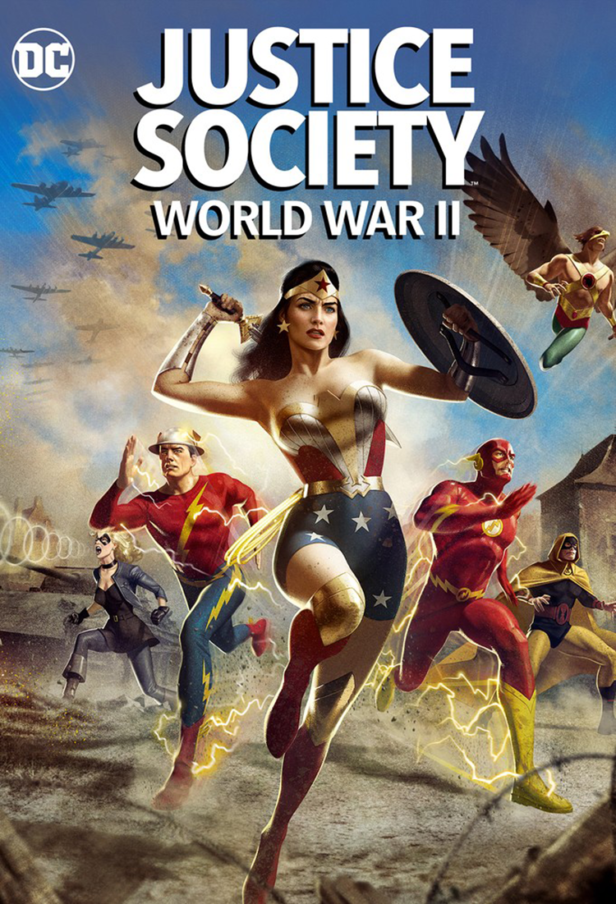“All I remember doing was reading [the script] over and over for like two days and I just remember… I think I cried!” actor Elysia Rotaru says, remembering when she first got the role of Black Canary in the latest DC animation movie, Justice Society: World War II. “I still have moments of tears of joy where I’m like: ‘This is so unreal’”
Indeed, the studio has been knocking it out of the park recently with its animated movies, ranging from light-hearted takes on Seventies kung-fu films with this year’s Batman: Soul of the Dragon to the devastating Justice League Dark: Apokolips War which saw some of DC’s icons find themselves on the wrong side of good and evil.
That momentum seems to be continuing with Justice Society: World War II which sees our favourite speedster the Flash (aka Barry Allen) accidentally jump to the rather unfortunate (and dangerous) moment in time of the mid-Forties and smack bang in the middle of the second world war. Even though we’ve seen Barry Allen time-jump in plenty of comic books, TV series and films, in JS: WWII this is definitely a new experience for him. In fact, this is a whole new take on time-jumping and on the character itself.
“As an actor, you’re always working on the script you have,” actor Matt Bomer tells us, who plays the Flash. “So even though you have these really deeply ingrained ideas of who these characters are from years of loving these iconic heroes, you have to really focus on the story with this character in this particular film.”
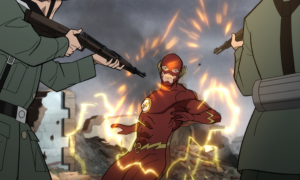
Indeed, this is a different, rather naive and young Barry Allen we see in Justice Society: World War II, who is quite new in his heroic career and is desperately trying to maintain a healthy balance between hero work and his relationship with his girlfriend Iris West. “His mind is in a million different places,” Bomer continues. “He’s completely scattered. He’s trying to do ten different things at once and he can’t really be present in his relationship with Iris and in his life. It’s only through his encounter with the Justice Society that he really starts to understand how we have to appreciate what we have at the moment and really be present in our lives, and the rewards we get from relationships when we take the time to really just be present with one person.”
Ah yes, the Justice Society. Being accidentally thrown into a world war might be tough enough on even the most laid-back of people. However, Barry is also thrown right into the path of DC’s Golden Age of Heroes who have formed to become the Justice Society of America, including the aforementioned Black Canary, Wonder Woman (Stana Katic), Hawkman (Omid Abtahi), Hourman (Matthew Mercer) and… the Flash?! This time in the form of Jay Garrick (voiced by Armen Taylor).
“It’s really shocking and jarring, particularly when he finds his new relationship to his powers in this different world,” Bomer says of Barry meeting Jay. “I think he’s really having to process and cope with a lot, on the move, as things are happening and transpiring. But what I loved about it is the fact that they’re able to coalesce and find ways to work together and use both their powers together in order to achieve things that they normally won’t be able to do on their own.”
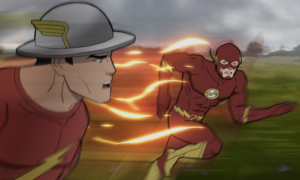
Even though Barry and Jay eventually learn to get on, the Justice Society doesn’t immediately warm to the intruding speedster. As if they didn’t have enough on their plate fighting a war and trying to defeat the Nazis, now they have another enhanced human to deal with who seems to think he’s from the future! Luckily Barry has that sharp wit and effortless charm to make his way through: “One of the things that bolster him is his sense of humour and adaptability and fortitude because it really is an unimaginable circumstance that he finds himself in,” Bomer explains. “I feel that honestly if the Justice Society weren’t in the middle of a war they would have taken more time to be like: ‘Who are you?’ But it’s really because of the stakes, of the circumstances the Justice Society is in, that he has to adapt and help out however he can as soon as possible because there isn’t time to really sit and relax and reflect on it all!”
In fact, it was that sense of humour that really appealed to Bomer, who’s played a multitude of DC characters both in animation (as Superman in Superman: Unbound) and on screen (as Larry Trainor in Doom Patrol): “His sense of humour was one of the most appealing things about the character and why I wanted to play the role. [It’s] his means of using it as both a way to ingratiate himself but also to make difficult circumstances a little bit more manageable!”
Speaking of manageable, taking on such iconic characters could be daunting for plenty of actors. Luckily the cast have almost 90 years of DC heritage to pull from when creating their own versions, including plenty of iterations of its most famous characters: “100% I looked at the past iterations,” Rotaru says, who’s also no stranger to DC, playing Taiana Venediktov in CW’s Arrow. “I also referenced the other amazing voice actors who have voiced the Black Canary in the past and the live-action stuff. I did have the luxury to work on Arrow for a season and I really loved the work Katie Cassidy was doing and then Juliana [Harkavy] stepped into the role so I watched a little bit of that too, just to see what they were doing on The CW.”
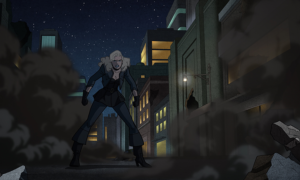
“Of course at the end of the day, it’s always lovely to get infused and informed by other performances and then just get guided in the booth by your director,” Rotaru continues. “That’s what I love the most about what I do. It’s just that collaborative effort of someone taking what you can bring, or bringing something out in you, and taking it from there and then playing around developing her.”
As with any good DC movie, there’s plenty of action and while the cast may not have had to squeeze themselves into lycra and go through rigorous stunt rehearsals, that doesn’t mean being in a booth recording those scenes was easy work: “Whoever says that voiceover animation work is easy, does not know the experience of working through a fight sequence, because I’ve only ever left sweaty and exhausted!” laughs Bomer. “I’m such a mess, honestly I can’t, I’m not very good at faking. It started with Superman, and it’s only continued to the Flash. I’m knocking things over, I’m sweating, red-faced, gasping for breath, I’m throwing punches, kicks, getting hit in the face, in the stomach. All the grunts and groans they typically save for the end of the recording session so you don’t lose your voice, especially if you get a little carried away as I do, but it’s honestly one of the most fun things to do. At first, I was very self-conscious the first time we did it on Superman and now I just throw caution to the wind and forget that anyone is watching me make a fool out of myself I just go crazy in there.”
Similarly, it wouldn’t be a DC movie without a good dose of trauma and it’s the Black Canary who shoulders a lot of the heavy emotional burdens in JS: WWII, an element that also took a lot of work while recording: “I had to dig deep,” Rotaru nods. “It’s something that I really believe life experiences help you with, for sure. One of my mentors growing up and studying in the theatre was like ‘go and get a life’. That’s how you bring life to your work, by going and having a life and you know, fortunately, and unfortunately, I’ve had events in my life that I could use as parallel situations that Black Canary might have had. Not to the extreme that [we see in the movie, but] I think you kind of have to tap into your resources and let yourself dive into your emotional cesspool sometimes and see what’s there. And if you don’t have it in your toolbox look elsewhere, look outside yourself and look at the world. This character is quite young, so it was kind of nice because it wasn’t too far-fetched from maybe where I’m living myself at the moment.”
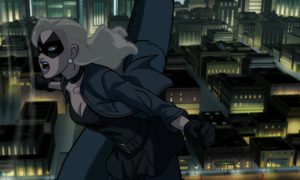
Speaking of the Black Canary, in JS: WWII she’s certainly on the back foot when Barry arrives, immediately not trusting him and wanting to get on with the task at hand without him. However, there are certainly glimpses at a softer side to the character, especially when it comes to her fellow Society members: “Black Canary definitely holds a strong chord with one of her fellow JSA members that you will witness when you watch the film and that resonated with me, through and through. Being part of an ensemble like that is something that, I almost hate to say it, is like I relate to her a lot because I’ve always had a lot of friends and been in groups of friends but I’ve always felt like I was a little bit on the outskirts with them just because I’m a floater like that. I don’t have my huge clique of five girlfriends all the time. I float around to a lot of groups of people and I feel like that is kind of Canary’s vibe a little bit too. She’s grounded in the group but then there’s also a little bit of a wall or guard up. So it’s nice to see her evolution and her process with that within the group.”
It’s certainly a complex (and cool) role that Rotaru was keen to become: “I think she’s got that edge,” she enthuses, “she’s a little bit ahead of the time. I mean even her outfit is just on point – I would love to get a cosplayer that looked like that and was like ‘hey check out my culottes’!
“I was so grateful to have brought a voice to that iteration because she just looks so different. It’s fun to see her like that and then with the parallel of Wonder Woman and then all the other JSA characters… like okay, there she is: blonde bombshell! It’s kind of cool, it’s hard for me to put it in words because I’m constantly smiling and my eyes are always big when I see her!”
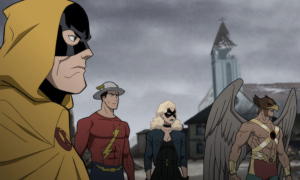
With such an impressive pedigree behind it, it’s clear that those involved in the making of JS: WWII are confident that the latest movie in the DC animated universe holds its own: “The animation style is phenomenal,” Bomer says. “I got a brief glimpse at it and it looked great when we first started recording. [It] has this great noir feel to the present world versus the world Barry finds himself in. There’s this great patina on the world when he meets the Justice Society. That was really effective. I think the voice-over work by all the actors – and this is really starting with Stana [Katic] and throughout the whole cast – is really strong.
“I found this particular piece really moving when I watched it. It’s got all the great action sequences that we’ve come to know and love from these DC animated films, which are always so fun to see and they don’t disappoint in this. But also there are moments in the film that I was really moved [by], and I think it will take some folks by surprise, hopefully in a good way.”
Justice Society: World War II is out now on digital, DVD and Blu-ray.
